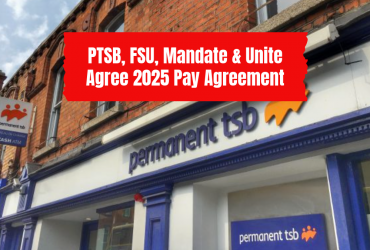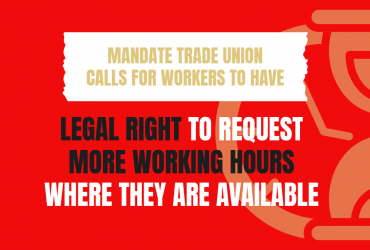MANDATE SAYS SUBSTANTIAL FLAT RATE PAY INCREASES NEEDED TO ADDRESS PROBLEM OF LOW PAY
Thursday 16 April 2009Research reveals pay for shop assistants averages between €15,225 and €22,721 per year.
John Douglas says his union will not entertain any calls for wage restraint from low paid workers.
Substantial flat rate pay increases are the only way to address the problem of low pay according to the Mandate trade union. The claim was made at the launch of a pay research document entitled End Low Pay today (Wednesday, 2 July 2008).
Mandate General Secretary, John Douglas said that given the general feeling amongst other trade unions, it would be impossible to reach an agreement in the current social partnership talks without addressing the issue of low pay. In addition, Mr Douglas said that his union will not entertain any calls for wage restraint from retail employees and other low paid workers.
End Low Pay shows that the problem of low pay is extensive in the largest employment sector in the country, the wholesale and retail sector, which employs over 310,000 workers or 15% of the country’s workforce. Mandate’s own information shows that in large multiple retail stores:
- The average starting wage is only €9.09 per hour. Assuming average working hours of 32.2 per week (National Employment Survey, 2006: average paid hours of employment in the wholesale and retail sector) this translates to just €15,225 per year;
- After ten years of service the average wage for a sales assistant is €13.57 per hour or €22,721 per year.
Speaking at the launch, the author of End Low Pay, researcher, Camille Loftus, said, “Growth in retail sales has been impressive, particularly when compared with other European countries. In 2007, the growth of retail sales by volume in Ireland was five times that of the Eurozone, while the value of retail sales grew by almost 7.5% in 2007. In fact, over the last three years, if earnings had been indexed to the value of sales, retail wages would have increased by 50-60% more than the actual increases received.”
Ms Loftus pointed out that the recent Irish Times Top 1,000 Companies report shows that the retail sector has nine companies in the top one hundred companies with estimated sales of just under €20 billion per year. This same report shows that two of the major retailers operating in Ireland announced profits this year in excess of €1 and €2 billion euro.
“However, the wage increases received by retail employees have been determined by the percentage rates agreed in social partnership rather than the performance of the industry itself. While this may seem fair, in practice it means that retail workers, who are on low pay get much smaller increases in their weekly wage than those on higher rates of pay, meaning that the gap between high earners and low earners continues to increase.”
In this context, End Low Pay shows that in the period 2001-2007, retail workers have fared poorly compared to other workers with similar skill levels. For example, the pay of unskilled operatives in the construction industry was more than double that of retail workers at mid point on their pay scale.
“However, the lowest paid workers in Ireland, those earning the national minimum wage have benefitted from flat rate increases in their hourly rate. This has meant that minimum wage workers received larger increases than many retail workers. If this trend continues, there is a risk that rather than providing a floor for low pay, the minimum wage would effectively be the ceiling for those in the low paid sectors.”
Camille Loftus explained that because low paid workers now pay no or very minimal tax, further tax cuts cannot deliver meaningful increases for low earners.
In this context, Mandate is seeking reform of the tax system and the introduction of specific refundable tax credits for low paid workers, similar to the systems being operated in the UK and the United States.
Speaking at the launch of End Low Pay, Mandate General Secretary, John Douglas said that retail employees and other low paid workers are being especially badly hit by the current inflationary trends as they spend a higher proportion of their income on essential items than better off groups.
“The most recent data on inflation from the Central Statistics Office shows that overall prices rose by 4.7% over the past 12 months. However, the cost of food and non-alcoholic beverages has risen by 7.8%; housing, water, electricity, gas and other fuels by 10.6%; education by 6.4% and health by 6.1%. Those on low incomes who were barely able to survive before are now really struggling. Higher earners have the capacity to absorb some of the inflationary pressures but it is unfair to ask those on low and middle incomes to take painful corrective actions in this climate,” John Douglas concluded.





